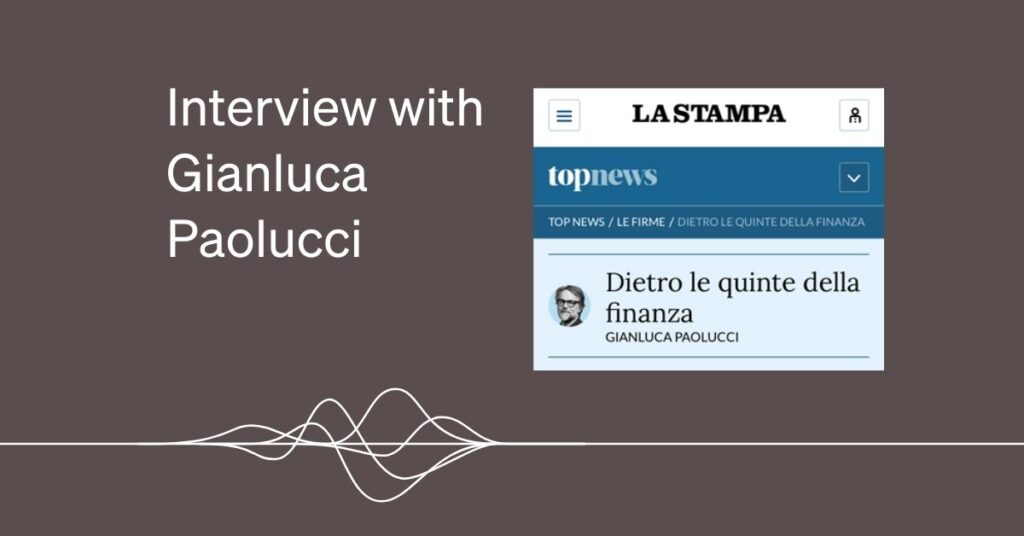Whistlelink webinars – a practical guide to whistleblowing Register now
Whistlelink webinars – a practical guide to whistleblowing Register now

How to get compliant with the Italian Whistleblowing Law
We catch up with Gianluca Paolucci, the Italian journalist who is Deputy Editor-in-chief at our partner, Dietro le quinte della finanza. A column in Italian daily newspaper, La Stampa. Hear his thoughts on the current state of whistleblowing in Italian journalism, what it means to him and the partnership with Whistlelink.
A. It is still a little-used and, worst of all, little-known tool.
There are some interesting examples that I can can think of, such as the work carried out a few years ago by the publication, l’Espresso, with RegeniLeaks to gather material on the case of the young Italian researcher killed in Egypt. Or WiredLeaks, the platform recently launched by Wired Italia which has already produced a sensational investigation into illegal online poker. But it is not yet a tool that readers and informants fully appreciate the potential of. Particularly, they don’t realise the essential aspect; that such a tool is secure and protects them and their sources.
I myself have managed my own anonymous reporting platform, but often found that informants who, faced with the possibility of using such a platform, still preferred to send an anonymous envelope to editorial staff. It makes you laugh, because it in fact means they prefer to use a nineteenth-century and unsafe practice rather than an effective contemporary tool.
A. It guarantees that those who make a report are completely anonymous, even towards me. The protection of informants is not important, it’s fundamental, for any journalist. Especially for those who deal with sensitive issues and follow sensitive stories.
The greater the delicacy of the topics covered, and the potential negative implications for the informants, the greater the need to rely on such a tool that guarantees total anonymity. And we are not talking about general confidentiality issues, but about real risks ranging from negative repercussions in the workplace to the extreme speculation of risks to personal safety.
That said, journalists are required to make more effort to get feedback and confirmations for the reports received, than with the so-called “traditional” channels. It is not enough to say ‘I know who told me and I trust it’, because with these tools, the source is completely anonymous and untraceable. But that is, or that should be, how journalists interact with their sources, regardless of the tool used.
A. The certainty of having a professional partner who has developed an efficient and user-friendly service, that is also in reach of users who may have limited knowledge of technology. This, of course, is without any repercussions on security, which, as I have said, is the essential aspect.
Also the possibility of being part of a network that, I am sure, will contribute to the knowledge and development of these type of tools, with positive effects for all the actors involved.
Are you looking for a safe and secure whistleblowing solution or would you like to discuss a whistleblowing system for your organisation? Please contact us to book a free demo of the Whistlelink platform!
Pokud máte nějaké komentáře k tomuto článku nebo se chcete dozvědět více o systému Whistlelink, rádi si vyslechneme váš názor.
Společnost Whistlelink si váží vašeho soukromí. Budeme vás kontaktovat pouze ohledně našich řešení.Z odběru se můžete kdykoli odhlásit. Další informace naleznete v našich Zásadách ochrany osobních údajů.


You can unsubscribe at any time. Learn more about how we process your data in our Privacy Policy.
HAPPY TO MEET YOU!
Whistlelink values your privacy. We will only contact you about our solutions.

S RADOSTÍ SE S VÁMI SETKÁME

TĚŠÍ NÁS, ŽE VÁS POTKÁVÁME
Vaše soukromí je pro nás důležité. Budeme vás kontaktovat pouze v případě, že se to týká našich řešení.

HAPPY TO MEET YOU!
Whistlelink values your privacy. We will only contact you about our solutions.
You may unsubscribe at any time. For more info, please review our Privacy Policy
